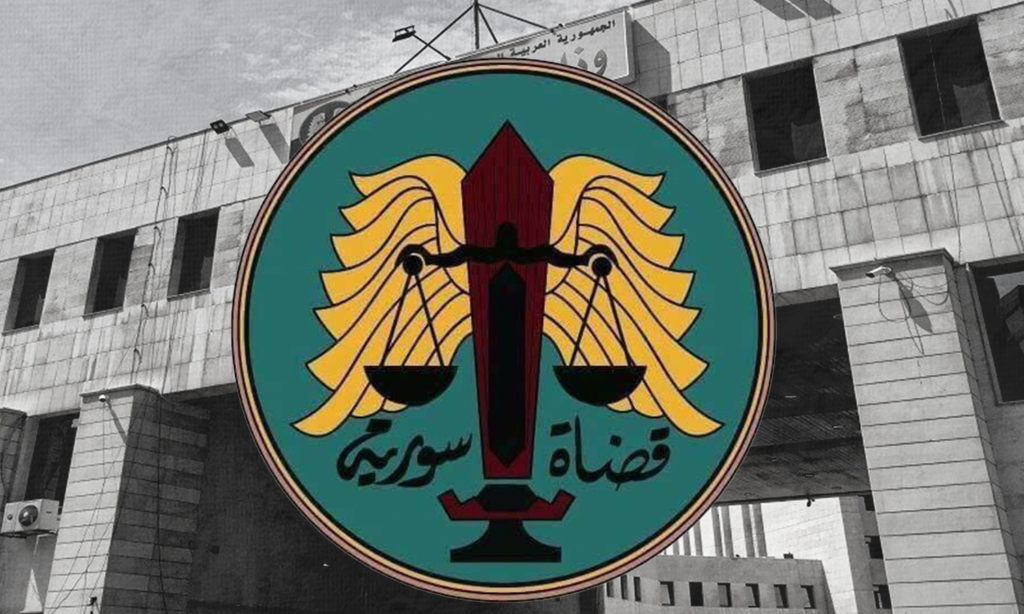On January 19, the President of the Syrian regime, Bashar al-Assad, issued two decrees, enforcing the penalty of dismissal against two judges.
The judges were reportedly penalized by the Higher Council of the Judiciary for “misconduct and violation of the law.”
Decree No. 13 of 2021 provided for dismissing Muhammad bin Ali Youssef, a judge of the First Court of Appeal in Jableh city, affiliated with the Latakia Judicial Department.
Decree No. 14 of 2021 provided for dismissing Rakan Muhammad Wahibeh, judge of the Seventh Court of Minor Offenses Appeal, affiliated with the Aleppo Judicial Department. The dismissal decision was enforced on January 19, 2021.
The type of violations or misconduct committed by the judges and invoked the dismissal penalty were not reported in both cases.
Disciplinary proceedings against judges
Legislative Decree No. 98 regulates the judicial powers of the Ministry of Justice, whereby as many as four disciplinary penalties can be enforced against judges—censure; forfeiture of salary; delayed promotion; and dismissal.
The penalty of censure, as stated by Article 106, consists in the delivery to the judge of a letter specifying the contravention committed and drawing his attention to the need to avoid such contraventions in the future. It may be decided not to record the censure in the judge’s file.
The penalty of forfeiture of salary consists in the deduction of an amount not exceeding one-tenth of the judge’s gross monthly salary for a period of not less than one month and not more than one year.
The penalty of delayed promotion consists in depriving the judge of promotion for a period of up to two years.
In line with Article 107, disciplinary liabilities against judges are enforced by the Higher Council of the Judiciary based on a decree issued by the Minister of Justice or Head of the Higher Council of the Judiciary. The decree is not published in the Official Gazette.
Article 108 stipulates that judges who are remiss in their duties, who say, do or write anything prejudicial to their personal honour or the honour of the judiciary, or who violate public laws and regulations, shall be referred to the Higher Council of the Judiciary.
Judges, referred to the Higher Council of the Judiciary, are not suspended unless the Council decides so.
“The national anti-corruption strategy has been improved,” Prime Minister of Syria, Hussein Arnous, said on 17 January. The strategy aims to establish the rule of the law; ensure that everyone is equal before the judiciary; and reinforce the role of oversight institutions and apparatuses to guarantee an effective evaluation of state service’s performance.
In a speech delivered to the People’s Council, Arnous added that ministries and various relevant institutions have taken measures to combat and limit corruption, as well as address its manifestations.
The justice ministry of the government of the Syrian regime, with concerned institutions, is currently implementing a judicial reform program within three fields: advancing integrity through amending the law; clearing backlog of cases at courts; reinforcing the judiciary’s independence; and providing the necessary infrastructure.
Judicial reshuffle: why?
On January 7, the Minister of Justice, Ahmed al-Sayyed, suspended or transferred a number of judges, for unknown reasons.
In December 2020, a number of judges were referred to the Higher Council of the Judiciary. The case spurred controversy among Syrian legal professionals, particularly since the full names of the involved judges were made public.
Commenting on the case, the minister of justice told Russia Today that judges of the Court of Cassation were referred to the Higher Council of the Judiciary. “The judges will be interrogated for certain violations,” but so far the judges were neither convicted, nor held liable to any penalties.
The procedure will remain classified until the interrogation has ended. The ministry also cannot declare the judge’s names, for decisions will be based on the investigation’s outcomes, which might provide for calling off trails, the minister added.
A Damascus-based legal professional reported to Enab Baladi the reshuffle the justice ministry has embarked on lately.
The recent changes within the judiciary system are “harmful,” he said, especially since most of these changes full under political “score-settling”, and “too rarely” they are aimed at corrupt officials.
Once in office, the newly assigned minister of justice would remove the staff of the former minister, replacing it with a new crew, mostly their affiliates. These new staffers are often assigned prestigious positions, either an advocate-general or first president of the Court of Cassation.
Normally such changes take place once early in the year. However, the existing minister of justice has done mass reshuffles since he was assigned in August 2020. These changes have hampered several open court cases; some were delayed for a year, others for two.
Ahmad al-Sayyed was assigned the minister of Justice after judge Hisham al-Sahaar.
Al-Sayyed is a Syrian judge from Quneitra city. He held several positions early in his career, including Counsel for the Court of Appeal in Damascus, and full-time Counsel for the Court of Cassation.











